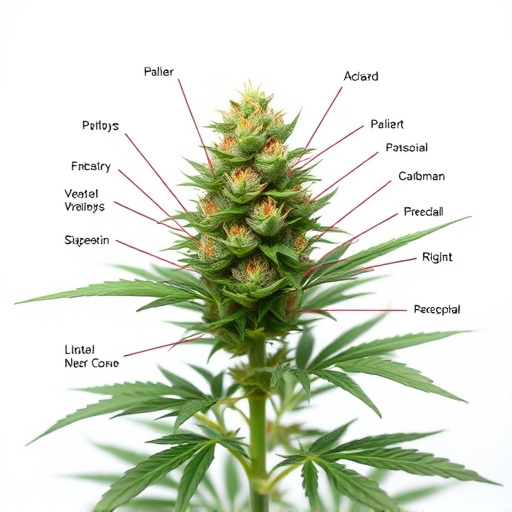Cannabis consumption offers short-term relief for pain through specific strains, but long-term smoking carries significant health risks. High THC can cause temporary memory and coordination issues, while regular exposure to marijuana smoke leads to respiratory problems. Prolonged use may also contribute to mental health challenges, cognitive impairments, and cardiovascular risks. For natural pain management, CBD-rich strains like Harlequin or Acai Berry are recommended; consulting a healthcare provider before incorporating cannabis into any treatment plan is essential.
“Uncovering the Side Effects of Smoking Weed: A Comprehensive Guide. While cannabis has gained popularity, understanding its impact on both short-term and long-term health is crucial. This article delves into the effects of weed consumption, highlighting the immediate changes in mind and body. Additionally, it explores the potential long-term consequences on overall well-being. Furthermore, we discuss how specific cannabis strains can be leveraged for pain management, offering natural alternatives to traditional methods.”
- Short-Term Effects of Weed Consumption
- Long-Term Impact on Health and Well-being
- Exploring Cannabis Strains for Pain Management Alternatives
Short-Term Effects of Weed Consumption

Smoking weed, or consuming cannabis, can have immediate effects on the body and mind, often referred to as short-term impacts. These effects vary depending on factors like the individual’s tolerance, the strain of cannabis (known for its unique chemical composition, including THC and CBD levels), and the method of consumption. In terms of cannabis strains for pain relief, some varieties are known to offer more balanced effects, providing a combination of analgesic properties (reducing pain) alongside potential calming or relaxing sensations.
Short-term effects can include altered sensory perception, heightened senses, and an altered sense of time. Users may experience increased appetite, often referred to as the “munchies,” and a feeling of euphoria or relaxation. Physically, it can lead to dry mouth, red eyes, and increased heart rate. In some cases, short-term memory and coordination issues have been reported, especially after consuming high-THC strains. These effects usually subside as the body metabolizes the substance, typically within a few hours to a couple of days.
Long-Term Impact on Health and Well-being

While many people use cannabis strains for pain management, long-term smoking can have detrimental effects on overall health and well-being. Regular exposure to the chemicals in marijuana smoke can lead to respiratory issues such as chronic bronchitis and increased risk of lung infections. The addictive properties of THC, the primary psychoactive compound in cannabis, can result in dependence and various mental health challenges, including anxiety and depression. These conditions are often overlooked but can significantly impact a person’s quality of life over time.
Additionally, prolonged marijuana use has been linked to cognitive impairments, particularly in memory and attention span. Research suggests that young adults who start using cannabis heavily may experience delayed brain development and face difficulties in academic and professional settings later in life. Moreover, there are concerns about the potential long-term effects on cardiovascular health, with some studies indicating an increased risk of heart disease and strokes among heavy cannabis users.
Exploring Cannabis Strains for Pain Management Alternatives

Many people turn to smoking weed, or cannabis, as a means of managing chronic pain. While it’s important to note that cannabis isn’t suitable for everyone and should be used under professional guidance, exploring specific cannabis strains can offer alternative options for pain relief. Different strains have distinct chemical profiles, with some containing higher levels of CBD (cannabidiol) and lower amounts of THC (tetrahydrocannabinol), which is the primary psychoactive compound.
CBD has gained significant attention for its potential anti-inflammatory and analgesic properties, making certain cannabis strains appealing for pain management. Strains like Harlequin, with its balanced CBD:THC ratio, or Acai Berry, known for its high CBD content, are often sought after by individuals looking to alleviate discomfort without the mental impairment associated with higher THC levels. These strains may provide a more natural approach to managing pain, but it’s crucial to consult a healthcare professional before incorporating cannabis into any treatment plan.
While cannabis has shown promise in managing pain through specific strains, it’s crucial to balance potential benefits with known side effects. Short-term impacts like cognitive impairment and anxiety are well-documented, while long-term risks include respiratory issues and mental health complications. Navigating cannabis consumption requires informed decisions, especially when considering its use for medical purposes, such as pain management. Exploring suitable cannabis strains should be done in consultation with healthcare professionals to ensure a safe and effective approach.














